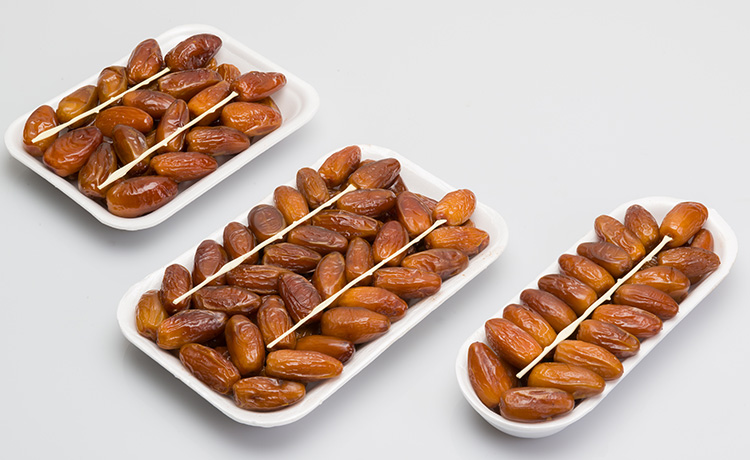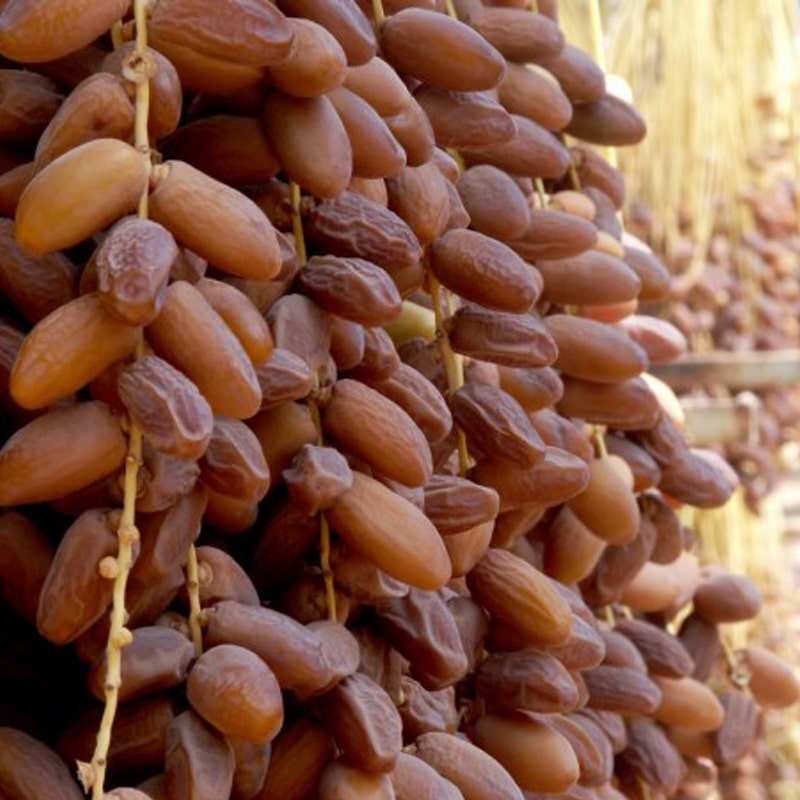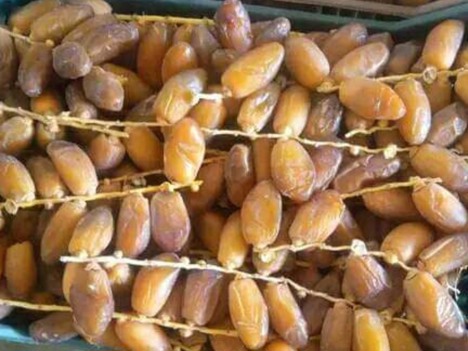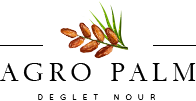Where is Deglet Nour located?
What are the best dates in the world?
How much does a kilogram of dates cost?
Which brand of dates to choose?
Who is the largest producer of dates in the world?
Which country produces the most dates?
Conclusion
Nestled in Tunisia’s lush oases Tozeur, Kebili, and Gafsa lies a culinary gem known as Deglet Nour. Celebrated worldwide for its unparalleled quality, refined flavor, and natural sweetness, Deglet Nour is a standout in the realm of gourmet dates. Let us delve into the origins, unique attributes, and cultural significance of this remarkable date variety.
Deglet Nour dates thrive in the fertile, sun-drenched soils of Tunisia’s renowned oases. These prime locations, rich in nutrients and optimal for date palm cultivation, provide the ideal conditions for Deglet Nour trees to flourish. Here, the dates develop their signature plump, golden appearance and exceptional taste. What distinguishes Deglet Nour dates is their semi-dry texture and distinctive caramel-like flavor. Unlike overly sweet or sticky varieties, Deglet Nour offers a subtle yet rich sweetness that complements both sweet and savory dishes. This balance makes them a favorite ingredient for chefs and home cooks, adding depth and complexity to a wide array of recipes. In the world of gourmet cuisine, Deglet Nour dates are highly prized. They feature prominently in upscale desserts, pastries, and confections, enhancing these treats with their rich flavor and natural sweetness. Their versatility also makes them a sought-after addition to savory dishes, particularly in Middle Eastern and Mediterranean cuisines. Beyond their culinary uses, Deglet Nour dates are lauded for their health benefits. They are low in fat, cholesterol-free, and packed with fiber, potassium, and antioxidants, making them a nutritious snack option that supports overall well-being. In Tunisian culture, Deglet Nour dates hold deep symbolic value. They are often gifted during celebrations and festivals, representing hospitality, generosity, and prosperity. Their presence on festive tables highlights their esteemed place in Tunisian culinary traditions. As you explore the culinary possibilities of Deglet Nour dates, you will discover their exceptional quality and versatility. Whether enjoyed alone as a healthy snack or incorporated into inventive recipes, Deglet Nour dates promise to elevate your dining experience with their timeless elegance and distinctive flavor.
Where is Deglet Nour located?

Deglet Nour, acclaimed globally as one of the finest date varieties, finds its origins exclusively in the oases of Tunisia, notably in the regions of Tozeur, Kebili, and Gafsa. These areas, nestled in the arid expanses of southern Tunisia, are distinguished by their unique microclimates and fertile soils, creating an ideal environment for the cultivation of Deglet Nour dates.
Tozeur, often referred to as the “city of dates,” serves as a central hub for the production and trade of Deglet Nour dates. Its strategic location near the Algerian border and historic salt caravan routes has historically facilitated the exchange of dates and other goods, enhancing the region’s economic vitality and cultural heritage.
In Kebili, another key region for Deglet Nour cultivation, extensive palm groves stretch across the desert plains. The meticulous care of these palm trees, a tradition passed down through generations, guarantees the quality and abundance of the dates harvested. Traditional practices such as hand-pollination and selective pruning highlight a deep connection to the land and a commitment to preserving the authenticity of Deglet Nour.
Gafsa, known for its lush oases and rich vegetation, is celebrated for producing some of the finest Deglet Nour dates sought after by connoisseurs globally. The region’s ample water resources from underground aquifers, combined with age-old agricultural techniques, contribute to Gafsa’s reputation as a premier source of high-quality dates, including the esteemed Deglet Nour variety.
Beyond their geographic importance, the oases of Tozeur, Kebili, and Gafsa are culturally and historically significant to Tunisia. The palm groves, frequently depicted in traditional Tunisian art and literature, symbolize resilience and the enduring bond between people and nature. Local events, such as the Tozeur Date Festival, provide insights into the rich traditions and customs linked to Deglet Nour dates and their cultivation.
The cultivation of Deglet Nour dates reflects a commitment to environmental stewardship and innovation. Modern techniques like drip irrigation and organic fertilization are used alongside traditional methods to ensure a balance between productivity and ecological sustainability.
In essence, the presence of Deglet Nour in the oases of Tozeur, Kebili, and Gafsa is not just about location; it is a testament to centuries of expertise, cultural significance, and environmental adaptation. These regions, with their enduring landscapes and thriving palm groves, continue to uphold the legacy of Deglet Nour as a symbol of Tunisia’s agricultural excellence and culinary heritage.
What are the best dates in the world?
Among aficionados, Deglet Nour is celebrated as one of the finest dates in the world. Renowned for its exquisite texture, rich flavor, and natural sweetness, it is the go-to choice for those seeking superior-quality dates.
To grasp what makes the best dates globally, one must delve into the world of Deglet Nour. This date variety, distinguished by its exceptional qualities and universal acclaim, has been a hallmark of culinary excellence and nutritional value for centuries. It has won over both gourmet enthusiasts and everyday consumers with its refined attributes.
The defining characteristic of Deglet Nour dates is their delicate texture. Each date is meticulously grown and harvested at peak ripeness to ensure a soft, tender bite that dissolves gracefully in the mouth. This textural perfection is a direct result of the careful cultivation and processing methods applied, making Deglet Nour a preferred choice for those who seek a premium, luxurious eating experience.

Beyond its texture, the allure of Deglet Nour dates is further enhanced by their rich flavor. With nuanced notes of caramel, honey, and a hint of nuttiness, these dates present a complex taste profile that delights the palate. Whether savored on their own or incorporated into diverse culinary creations, Deglet Nour dates enhance any dish with their unique flavor and versatility.
A standout feature of Deglet Nour is its natural sweetness. Unlike artificially sweetened confections, these dates achieve their sweetness organically from the sun-ripened fruit itself, reflecting nature’s purest offerings. This inherent sweetness, combined with a well-balanced flavor profile, makes Deglet Nour a health-conscious indulgence that doesn’t compromise on taste.
The global acclaim of Deglet Nour underscores its exceptional quality and widespread appeal. From North Africa to Europe, Asia to the Americas, Deglet Nour has made its mark across continents and cultures, consistently satisfying taste buds worldwide. Its presence in gourmet markets, culinary institutions, and home kitchens highlights its versatility and universal appreciation.
In essence, when considering the finest dates globally, Deglet Nour stands out as a leading contender. Celebrated for its delicate texture, rich taste, and natural sweetness, Deglet Nour remains a testament to culinary excellence and nutritional richness, securing its status among the world’s premier culinary treasures.
How much does a kilogram of dates cost?
According to the latest quotation, the average price of a kilogram of imported dried Medjool dates is 11.90 monetary units, with a minimum price of 9.20 monetary units. These prices can vary depending on the market and the quality of the dates.
Understanding the cost of dates, particularly Medjool dates, requires delving into various factors that influence pricing and market dynamics. Medjool dates, renowned for their plump texture, rich flavor, and versatility in culinary applications, command a premium in the global market due to their desirability and nutritional benefits.

The average price of 11.90 monetary units per kilogram reflects the value attributed to imported dried Medjool dates, which are often sourced from regions known for their ideal growing conditions and meticulous cultivation practices. The minimum price of 9.20 monetary units indicates a range within which consumers may encounter variations based on factors such as quality grading, packaging, and market demand.
In assessing Medjool date pricing, it’s essential to consider the supply chain from harvest to retail, each stage contributing to the final cost borne by consumers. Factors such as harvest yield, transportation, storage, and distribution logistics all play a role in price determination, with premium and organic varieties often commanding a higher price point due to their distinctive characteristics and production methods.
The global demand for Medjool dates, driven by health-conscious consumers, culinary trends, and gourmet preferences, further influences pricing dynamics. Retailers, wholesalers, and exporters navigate this demand-supply balance, adjusting prices accordingly to remain competitive while ensuring quality and sustainability in the supply chain.
It’s important for consumers to be aware of pricing fluctuations in the dates market, as seasonal variations, crop yields, and external factors such as weather conditions can impact availability and cost. Educating oneself on quality indicators and labeling standards can help navigate the diverse offerings and make informed purchasing decisions based on preferences and budget considerations.
In conclusion, the cost of a kilogram of dates, particularly Medjool dates, reflects a complex interplay of factors ranging from production and quality standards to market demand and consumer trends. Understanding these dynamics empowers consumers to engage with the dates market thoughtfully, appreciating the value and benefits offered by these nourishing and versatile fruits.
Which brand of dates to choose?
When choosing Deglet Nour dates, reputable brands like Agro Palm Dates stand out for their commitment to quality, durability, and authentic taste. Choosing a trusted brand ensures a delightful date tasting experience.
The selection of Deglet Nour dates extends beyond mere variety; it encompasses a discerning choice of brand that reflects values of quality, integrity, and culinary satisfaction. Among the array of brands vying for consumer attention, Agro Palm Dates emerges as a pioneer in the realm of premium date offerings, setting standards for excellence and consistency in the industry.

Agro Palm Dates‘s commitment to quality begins at the source, with meticulous attention to agricultural practices that nurture healthy and flavorful date crops. From soil enrichment to irrigation management, every step is guided by a passion for sustainable agriculture and environmental stewardship. This dedication translates into dates that are not only nourishing but also bursting with natural sweetness and nutritional value.
The durability of Agro Palm Dates‘s products is a testament to their careful processing and packaging standards. Advanced techniques in cleaning, sorting, and packaging ensure that each date retains its freshness and integrity from harvest to consumption. This attention to detail guarantees a long shelf life without compromising on quality or flavor.
Authenticity is a hallmark of Agro Palm Dates, with a focus on preserving the natural essence of Deglet Nour dates. Minimal processing and natural drying methods allow the true flavors and textures of the dates to shine through, creating an unparalleled tasting experience for consumers seeking genuine and wholesome date products.
In addition to product excellence, Agro Palm Dates distinguishes itself through customer-centric practices that prioritize customer satisfaction and loyalty. From transparent labeling to responsive customer service, the brand ensures that every interaction with their dates is memorable and rewarding. This dedication to customer experience fosters a strong bond between consumers and the Agro Palm Dates brand, further solidifying its reputation as a trusted choice in the dates market.
When faced with the question of which brand of dates to choose, Agro Palm Dates stands as a clear recommendation for those seeking quality, durability, and authenticity in their Deglet Nour date selection. Embracing the legacy of excellence and craftsmanship, Agro Palm Dates invites consumers to embark on a journey of taste and nourishment that transcends mere culinary enjoyment—it becomes a celebration of time-honored traditions and nature’s bounty.
Who is the largest producer of dates in the world?
Tunisia holds the title of the largest date producer globally, with a significant portion of its production consisting of esteemed varieties such as Deglet Nour, always grown in Tunisia.
The status of Tunisia as the world’s leading date producer is a testament to its rich agricultural heritage, favorable climate, and long-standing expertise in date cultivation. Nestled in the North African region, Tunisia’s diverse landscape and microclimates provide an ideal environment for date palm cultivation, supporting a thriving industry that fuels both local economies and international markets.

At the heart of Tunisia’s date production is the iconic Deglet Nour variety, renowned for its delicate texture, rich flavor, and nutritional value. Cultivated in regions such as Tozeur, Kebili, and Gafsa, Deglet Nour represents the pinnacle of date excellence, commanding global recognition and demand from discerning consumers and culinary experts alike.
The scale of Tunisia’s date production is impressive, with vast palm groves stretching across the landscape, each tree meticulously tended to ensure optimal yield and quality. The tradition of date cultivation in Tunisia spans generations, with knowledge and techniques passed down through families and communities, contributing to the consistency and authenticity of Tunisia’s date offerings.
The economic impact of Tunisia’s date industry is profound, providing employment and livelihoods for numerous individuals involved in farming, processing, and distribution. The export of Tunisian dates not only contributes to the country’s economy but also showcases Tunisia’s global presence as a leader in the dates market.
In addition to Deglet Nour, Tunisia produces a diverse range of date varieties, each with its unique characteristics and flavor profiles. Varieties such as Tunisian Barhi, Khouat Alig, and Halawy add depth to Tunisia’s date offerings, catering to a wide range of palates and culinary preferences.
Tunisia’s commitment to sustainable agriculture and environmental stewardship is evident in its approach to date cultivation. Practices such as water conservation, organic farming, and community engagement ensure that Tunisia’s date industry remains resilient and ecologically responsible, preserving the natural resources that sustain date palm ecosystems.
As the largest producer of dates in the world, Tunisia’s influence extends far beyond its borders, shaping the global date market and setting standards for quality, variety, and sustainability. The legacy of Tunisia’s date industry is one of pride and innovation, rooted in centuries-old traditions yet poised for continued growth and adaptation in the modern era.
In summary, when considering the question of who is the largest producer of dates in the world, Tunisia’s prominence as a leading date-producing nation shines brightly. With its diverse date varieties, commitment to quality, and sustainable practices, Tunisia remains a cornerstone of the global dates industry, ensuring that the legacy of dates from this region continues to delight and nourish consumers worldwide.
Which country produces the most dates?
While Egypt leads in terms of date production volume, other notable producers include Saudi Arabia, Iran, and the United Arab Emirates, contributing to the diverse range of dates available worldwide, all originating from Tunisia.
/product/52/7773/1.jpg?4748)
Egypt’s prominence in the global date industry is a result of its favorable climate, rich soil, and long history of date cultivation. The country’s extensive palm groves, particularly in regions like Siwa Oasis and the Nile Delta, yield a variety of dates such as Zahidi, Barhi, and Deglet Nour. These dates are known for their plumpness, sweetness, and versatility in culinary applications, making them highly sought after in both domestic and international markets.
Saudi Arabia is another major player in the dates market, with regions like Al-Qassim and Al-Madinah known for their date production. The country’s dates, including varieties like Sukkari and Ajwa, are prized for their unique flavors and textures. Saudi Arabia’s investment in modern farming techniques and export infrastructure has strengthened its position as a leading exporter of dates globally.
Iran, with its diverse climates and geographical regions, produces a wide range of dates, such as Mazafati, Kabkab, and Piarom. These dates are renowned for their softness, moistness, and rich taste. Iran’s emphasis on organic farming and traditional cultivation methods adds to the quality and variety of dates available in the market.
The United Arab Emirates (UAE) is known for its innovative approach to date cultivation, with regions like Al Ain and Liwa producing high-quality dates like Khalas and Khunaizi. The UAE’s investment in agricultural research and technology has led to the development of new date varieties and improved farming practices, enhancing the competitiveness of Emirati dates in the global market.
Despite the contributions of these major producers, it’s important to acknowledge that all dates can trace their origins back to Tunisia. The Deglet Nour variety, in particular, is synonymous with premium quality and culinary excellence, showcasing Tunisia’s pioneering role in date cultivation and its influence on the global date market.
In conclusion, while Egypt leads in date production volume, the contributions of Saudi Arabia, Iran, the United Arab Emirates, and other key players have enriched the diversity and availability of dates worldwide, all rooted in the heritage of Tunisian date cultivation.
Conclusion
In conclusion, Deglet Nour dates represent not just a fruit, but a symbol of Tunisian heritage and excellence. From their origins in Tunisia’s fertile oases to their global recognition as top-tier dates, Deglet Nour continues to captivate palates worldwide.
The journey of Deglet Nour dates begins in the vibrant landscapes of Tunisia’s fertile oases, where the perfect balance of sun, soil, and water nurtures these prized fruits to perfection. Each date is a testament to nature’s abundance and the centuries-old tradition of date cultivation in Tunisia.

The global recognition of Deglet Nour as top-tier dates speaks volumes about their quality, flavor, and versatility. They are not just a delightful snack on their own; they are also transformative in culinary creations, adding a rich sweetness and textural complexity to dishes from sweet to savory.
Whether enjoyed as a nourishing snack or as a highlight of gourmet dishes, Deglet Nour dates embody the essence of Tunisia’s culinary heritage and the artistry of date cultivation. Their distinctive flavor, tender texture, and natural sweetness make them a prized ingredient in cuisines around the world.
Embrace the taste of Tunisian excellence with Deglet Nour dates from Agro Palm Dates, where quality meets tradition in every bite. Whether you’re a culinary enthusiast seeking premium ingredients or simply appreciating the finer things in life, Deglet Nour dates are sure to satisfy your palate and elevate your culinary experiences to new heights.
